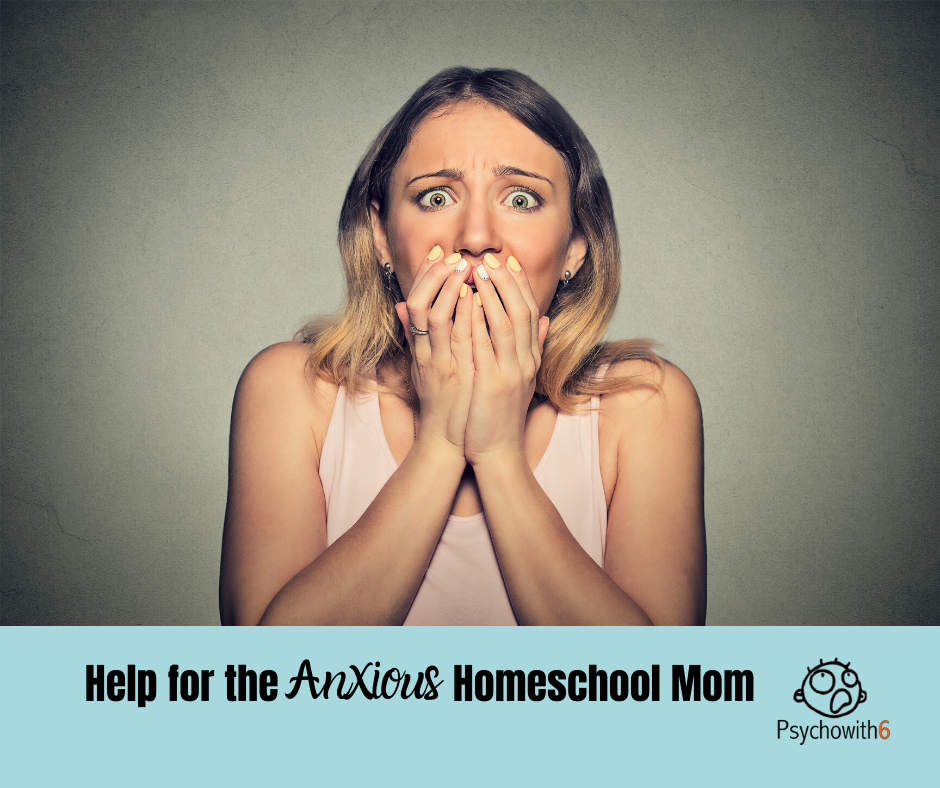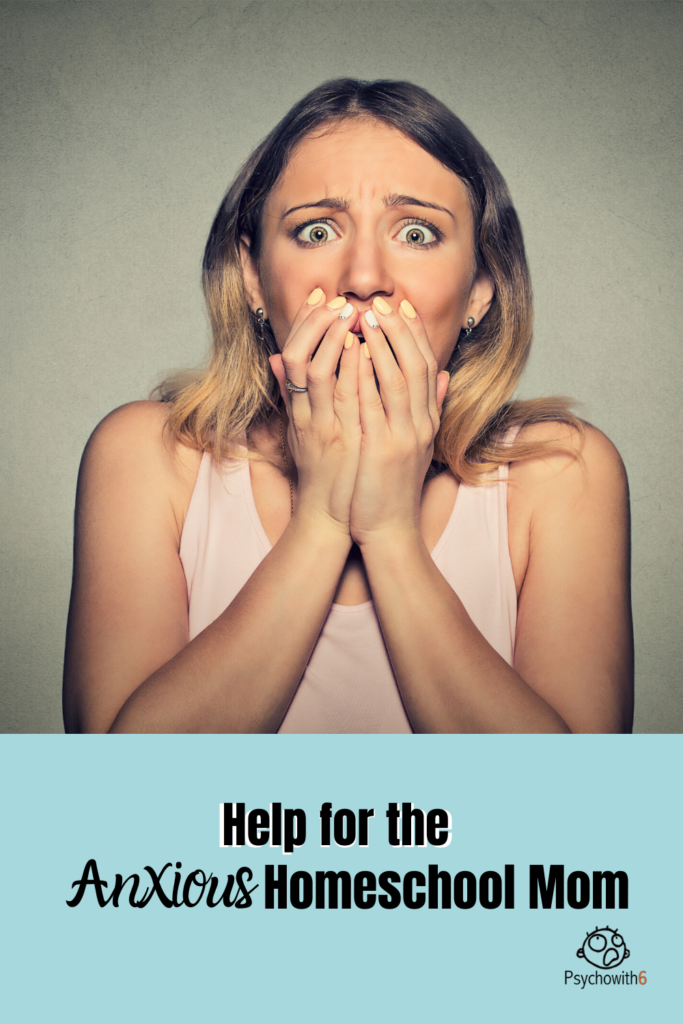
Homeschool mom, what are you anxious about?
I can tell you what I was anxious about as a new homeschooling mom. I was afraid I would fail at teaching my kids. I wasn’t a trained teacher, after all.
But even though I’m a psychologist, I was also afraid I would fail as a mom. I thought my kids might grow up to write a tell-all book about my failings: Mommy Dearest II.
Those are two big fears, but I had many more. I was afraid for my health. I was afraid that pesticides and GMOs were killing me. I was afraid my fillings were giving me MS. I was afraid I was becoming allergic to every food.
I was afraid for my family too. I was afraid my son had MD when he started limping as a toddler. On a grand scale, I was afraid my kids would grow up to reject God and our family. I was afraid in my relationships. I was afraid I wouldn’t have any friends when a friend rejected me or moved away. I was afraid we were in the wrong church that was on the wrong path.
I was afraid of little things as well. I had a tightness in my gut every time we were running late. I was terrified of forgetting appointments and making people mad. You name it. I was afraid of it.
At one point my anxiety was so bad that my physical and mental health were in shambles. So I am not just speaking to you as a psychologist. I understand where you are if anxiety is a problem.
Where Anxiety Comes From
Before I tell you how to deal with your anxiety, let’s talk about where it comes from.
Anxiety has a biological component. You may have inherited a predisposition for it. Your idle may be set too fast. Or you may have a physical condition that is contributing to your anxiety. A poorly functioning thyroid gland or hormonal shifts are common culprits.
Caffeine and other stimulants worsen anxiety. I am sensitive to caffeine. I had a frappe one morning and later that day I couldn’t figure out what I was feeling so anxious about.
Depression and anxiety often co-occur. If you suffer from depression, getting help for it can improve your anxiety as well.
Anxiety can be environmental. If you live or work in a place that is unpredictable and threatening, anxiety is a normal response. Until you feel safe physically, emotionally, and even financially, getting past your anxiety will be difficult. Recent research demonstrates that living in a cluttered environment raises your cortisol level, a marker for stress.
Finally, anxiety can be mental and spiritual. Specifically, anxiety is related to what you believe. These types of beliefs can produce anxiety that becomes dysfunctional. For example:
I have no options. Feeling that we can’t do anything to change our situation leads to feelings of helplessness and hopelessness.
God helps those who help themselves. This unScriptural notion leads us to want to solve our own problems, even though God wants us to leave it to Him.
I can’t trust anyone. We refuse to accept help because we don’t trust that God can work through others for our benefit.
If it is to be, it’s up to me. We carry the weight of the world on our shoulders. We bear all the responsibility and the blame for everything.
Satan is in control of this world. We forget that Satan can only do what our loving God permits. He is not even close to being God’s equal. Jesus and His body, the church, isn’t on the run.
The Prescription for the Anxious Homeschool Mom
All this talk may be making you anxious! I get it. But I have a prescription that should calm you down. Ready?
First, take care of your body.
If you are anxious, schedule a physical and mention your anxiety symptoms. Your thyroid or hormones may be contributing to the problem. Let your doctor know about any medications or supplements you are taking as these may also contribute to anxiety.
Cut back on caffeine. You don’t need anything revving your engine, right?
Cut back on or eliminate alcohol. Anxious people often medicate with alcohol. While alcohol can decrease anxiety temporarily, it also interferes with sleep and can destroy brain and liver tissue as well as relationships–even if you never work or drive while under the influence.
Practice good sleep hygience. Keep your room dark and cool enough for you to sleep. Don’t use screens right before bed. Go to sleep and get up at the same times, even if you aren’t sleeping well.
Exercise vigorously. Exercise is critical for getting anxiety under control. You must get your heartrate up consistently and I recommend daily exercise. I’d prefer that you are sweating and fatigued after working out or it won’t be as effective in managing anxiety. High intensity interval training is an excellent choice. When you exercise to fatigue, your system won’t be able to overreact to your thoughts.
Consider medication if your doctor recommends it for the short-term. If your anxiety is severe enough that it is wreaking havoc on your physical health, consider taking something to help you do the mental and spiritual work that needs to be done for the long-term. If you don’t like it, you don’t have to keep taking it. In most cases, the risk of side effects is lower than the risk of a weak immune system from high anxiety.
Address the mental and spiritual side of anxiety.
After you’ve taken care of your body, you can address the mental and spiritual side of anxiety.
The first task at hand is to change the way you think. Our thoughts produce anxiety. Changing the way that we think changes our emotions and even our brain chemistry.
If you have a mild problem with anxiety, I recommend listening to How to Stop Worrying and Start Living by Dale Carnegie. I highly recommend the audiobook version. I also recommend The Anxiety & Worry Workbook by Clark & Beck. These books will help you to think differently, thereby reducing your anxiety.
If you have a moderate to severe problem with anxiety, I recommend seeking out a cognitive-behavioral therapist for help. A CBT therapist will not analyze your childhood but will give you proven tools for changing the way you think and respond in anxiety-provoking situations. An ethical therapist will not contradict your faith, even if he or she doesn’t share it.
Changing the way we think is also fundamental to our spiritual health. If we think that God isn’t really good, doesn’t really love us, and won’t help us, we will experience profound anxiety. This is where I was spiritually. If you had asked me whether I believed those things about God, I would have said no. But I didn’t truly trust Him.
I believe we all have to make a choice once we know Christ. Do we choose to believe that God is good, that He loves us, and will work all things together for our good? Or do we believe that we’re on our own because God doesn’t care? When you’ve decided to believe God no matter what, it makes life so much easier. It means that even when the unthinkable happens and we are grieving without an explanation, we know that God is there, loving us, and working everything together for our good.
Renew Your Mind
The final way to manage our anxiety that I’m going to discuss in this episode is to renew your mind. We have allowed unhealthy thoughts to flood our system day after day. Now we have to marinate our minds in the truth. Reading the word and Christian books daily can help strengthen our faith. The Christian biographies the Benges have written are a great option for you.
Another way we can renew our minds is by spending time with mature Christians. These men and women who have been refined in the fire will continue to speak truth to you and will demonstrate God’s faithfulness in their lives. I have friends who have lost children and spouses, and they all praise God for sustaining and blessing them.
Conclusion
I want you to know that neither climate change nor a new strain of the flu can take you out of God’s hands. He has numbered our days and no one and nothing can change that. I wish you His peace, my friend, and pray that He relieves you of the oppression of anxiety.







